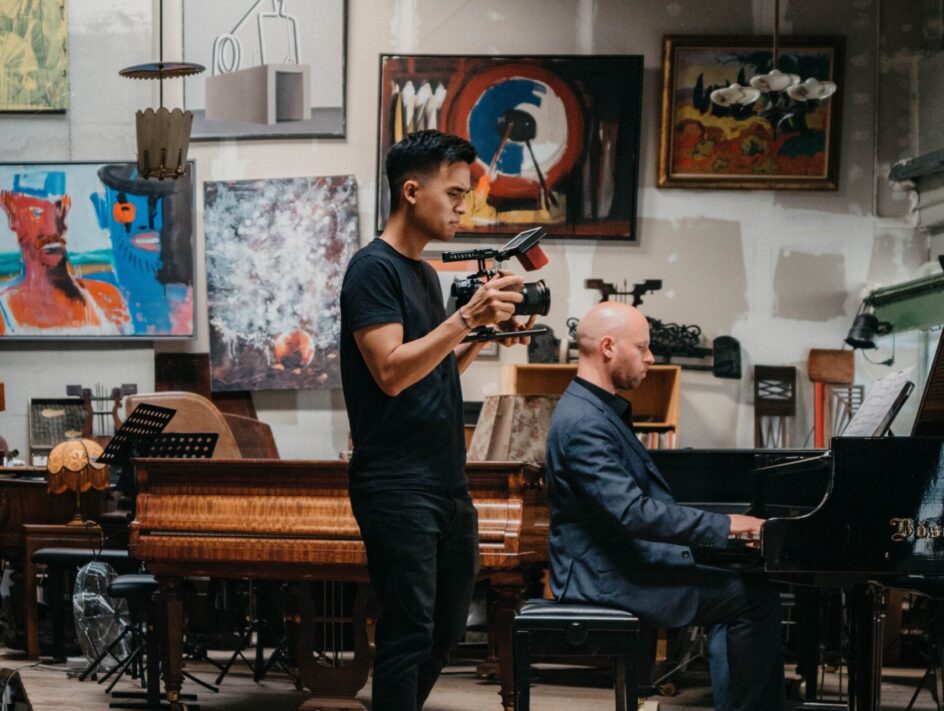COLUMBUS, OH—Ohio Humanities and the Wexner Center for the Arts at The Ohio State University are excited to share information about the second group of filmmakers and projects to receive funding through a three-year partnership to support independent filmmaking.
“We are honored to continue our longstanding tradition of supporting Ohio’s stories and storytellers alongside our partners at the Wex,” says Ohio Humanities Executive Director Rebecca Brown Asmo. “The Ohio Humanities Film Fellowship provides crucial resources to up-and-coming filmmakers across the state to tell stories that connect Ohioans, strengthen our communities, and allow us to reflect on our shared human experiences.”
Ohio Humanities Film Fellowships are open to individuals creating humanities-informed documentaries with connections to the Buckeye State. The four filmmakers chosen for the 2024–25 cycle represent a variety of perspectives, concerns, and career stages. They also reflect the richness of history and experience found within Ohio’s borders.
The 2024–25 group of fellows follow in the footsteps of the first group of Ohio Humanities Film Fellows: Mary Jo Bole, whose work Family White Elephants is awaiting its world premiere, and Zeinabu irene Davis and Ruun Nuur, whose respective projects are still in production.
“The Film/Video department is thrilled to welcome this new cohort of Ohio Film Fellows to the Wex and to support their work through funding, mentorship, and in-kind resources,” says Head of the Film/Video Studio Program Jennifer Lange. “These four projects, and the many incredible proposals we received, point to the strength and diversity of Ohio’s independent filmmakers.”
The 2024–25 Fellows:
Eli Hiller (Columbus)
A graduate of Ohio University, Hiller is a Filipino-American documentary filmmaker who spent three years living in the Philippines to grapple with his Filipino roots before returning to the US, where he’s documented political protests and shot on assignment for Getty Images.
With the project Becoming Us, Hiller shares his personal history as the child of a single mother and a sperm donor. In a search for his biological father to help reconcile his racial identity, Hiller discovers four donor-conceived siblings. His documentary reveals the different ways each were shaped by their shared ancestry and circumstances of parentage.
Kiubon Kokko (Dublin)
Holding on to Water explores the experience of being a first-generation Asian American in Ohio in the early 21st century by grounding it in past trauma—the 10-hour marathon swim Kokko’s father undertook in 1973 to escape from China to Hong Kong and the political environment that led hundreds of thousands of others to attempt the same.
Kokko is an emerging filmmaker and writer who’s been working in the field professionally since 2019. His family moved to Ohio in 1997.
Lindsey Martin (Athens)
Described by the filmmaker as “part adventure story, part labor history,” the short, animated docudrama Doorknob combines the history of Ohio pottery towns of the Industrial Revolution with Appalachian folktale traditions and the visual style of Medieval manuscripts. It tells the story of a young woman barrel maker in 1849 East Liverpool who takes a creative approach to trying to reach her three ailing sisters in her hometown downriver.
Martin is an assistant professor of film production at Ohio University. Her work has screened at festivals including Slamdance, the Cleveland International Film Festival, the Athens International Film and Video Festival, and the Provincetown International Film Festival.
Benny Zelkowicz (Columbus)
Over an animation career spanning more than two decades, Zelkowicz has contributed character design for film, television, and commercials, including work on The LEGO Movie and The Simpsons. He’s also directed and provided the voice for the lead character of the CBC/BBC series Lunar Jim.
For the short Sacred Society, Zelkowicz uses sand animation to tell the true story of the Chevra Kadisha, a group of volunteers who perform Jewish burial rituals. The work is informed by Zelkowicz’s own experience as a member of the group, which he was inspired to join by the 2018 mass shooting at the Tree of Life Synagogue in his hometown of Pittsburgh.
About the Wexner Center for the Arts
The Wexner Center is The Ohio State University’s multidisciplinary laboratory for contemporary art and culture. Through exhibitions, performances, screenings, educational programs, artist residencies, and publications, the Wex serves as a vital forum where artists test ideas and where diverse audiences engage the art and issues of our time. In its programs, the Wex balances a commitment to experimentation with a critical appreciation of the past. Our work affirms the university’s pursuit of civic participation, freedom of expression, and robust dialogue. More info is at wexarts.org.
Media Contact: Kiley Kinnard
kkinnard@ohiohumanities.org

